介词和连词的用法及专项练习
- 格式:doc
- 大小:39.74 KB
- 文档页数:5
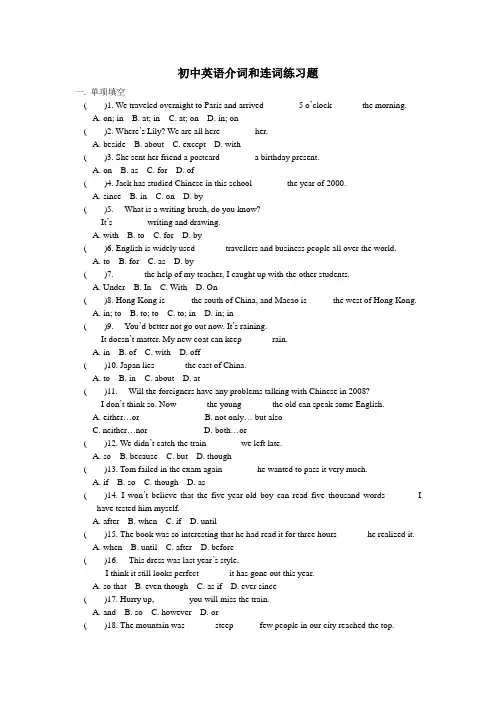
初中英语介词和连词练习题一. 单项填空( )1. We traveled overnight to Paris and arrived _______ 5 o’clock ______ the morning.A. on; inB. at; inC. at; onD. in; on( )2. Where’s Lily? We are all here _______ her.A. besideB. aboutC. exceptD. with( )3. She sent her friend a postcard _______ a birthday present.A. onB. asC. forD. of( )4. Jack has studied Chinese in this school _______ the year of 2000.A. sinceB. inC. onD. by( )5. ---What is a writing brush, do you know?---It’s _______ writing and drawing.A. withB. toC. forD. by( )6. English is widely used ______ travellers and business people all over the world.A. toB. forC. asD. by( )7. ______ the help of my teacher, I caught up with the other students.A. UnderB. InC. WithD. On( )8. Hong Kong is _____ the south of China, and Macao is _____ the west of Hong Kong.A. in; toB. to; toC. to; inD. in; in( )9. ---You’d better not go out now. It’s raining.---It doesn’t matter. My new coat can keep ______ rain.A. inB. ofC. withD. off( )10. Japan lies ______ the east of China.A. toB. inC. aboutD. at( )11. ---Will the foreigners have any problems talking with Chinese in 2008?---I don’t think so. Now ______ the young ______ the old can speak some English.A. either…orB. not only… but alsoC. neither…norD. both…or( )12. We didn’t catch the train _______ we left late.A. soB. becauseC. butD. though( )13. Tom failed in the exam again _______ he wanted to pass it very much.A. ifB. soC. thoughD. as( )14. I won’t believe that the five-year-old boy can read five thousand words ______ I have tested him myself.A. afterB. whenC. ifD. until( )15. The book was so interesting that he had read it for three hours ______ he realized it.A. whenB. untilC. afterD. before( )16. ---This dress was last year’s style.---I think it still looks perfect ______ it has gone out this year.A. so thatB. even thoughC. as ifD. ever since( )17. Hurry up, _______ you will miss the train.A. andB. soC. howeverD. or( )18. The mountain was ______ steep _____ few people in our city reached the top.A. so…asB. so…thatC. as…asD. too…to( )19. ---Do you remember our pleasant journey to Xi’an?---Of course. I remember everything ______ it happened yesterday.A. as soon asB. even thoughC. rather thanD. as if( )20. ______ you can’t answer this question, we have to ask someone else for help.A. AlthoughB. WhileC. WhetherD. Since二. 用适当的介词填空1. ---How are you going to the train station to meet your aunt?---I’m going there _______ my car.2. Mum, today is Mother’s Day. Mike and I want to invite you to have dinner _____ us atZhonglou Restaurant.3. Hangzhou is famous ______ the West Lake.4. Today some newly-produced mobile phones can take pictures ______ a camera.5. Could you tell me if there is a flight to the capital ______ March, 25th?6. We all agree ______ you. Let’s start at once.7. There is a big shop ______ the other side of the road.8. ---Which necklace have you lost?---The one you gave me _____ my birthday.9. You should take more exercise. It’s good ______ your health.10. It is clear that fish cannot live _______ water.三. 用适当的连词填空1. ______ they are brothers, they don’t look like each other at all.2. The dress was very expensive, ______ I didn’t buy it.3. ---Do you know ______ I could pass the exam?---Sorry, I’ve no idea.4. Mr. Brown knows little Japanese, ______ he can’t understand the instructions on the bottle ofthe pills.5. The war was over about a year ago, ______ the American soldiers in Iraq are still having a lotof trouble to deal with.6. ---Is David at school today?---No. He is at home _______ he has a bad cold.7. _____ Lily _____ Lucy may go with you because one of them must stay at home.8. Study hard, _____ you are sure to have a good result in the exam.9. Please have a wash _______ you go to bed.10. The twins have learned a lot ______ they came to China.【练习答案】一. 1.B 2.C 3.B 4.A 5.C 6.D 7.C 8.A 9.D 10.A11.B 12.B 13.C 14.D 15.D 16.B 17.D 18.B 19.D20.D二. 1.in 2.with 3.for 4.like 5.on 6.with 7.on 8.for 9.for 10.without三. 1.Although/ Though 2.so 3.if/ whether 4.so 5.but 6.because 7.Either…or 8.and 9.before10.since。
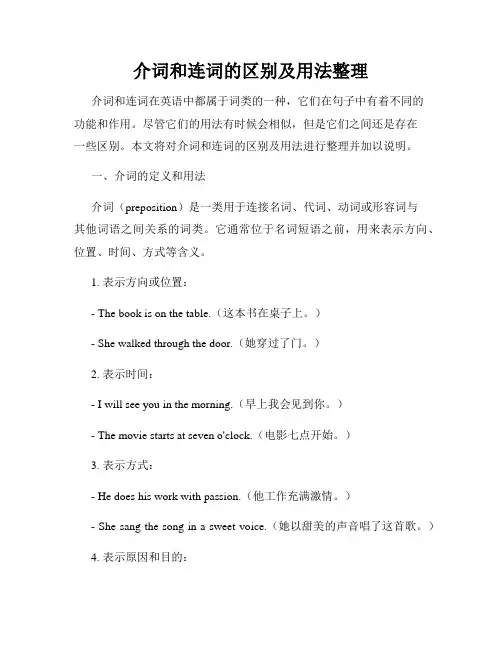
介词和连词的区别及用法整理介词和连词在英语中都属于词类的一种,它们在句子中有着不同的功能和作用。
尽管它们的用法有时候会相似,但是它们之间还是存在一些区别。
本文将对介词和连词的区别及用法进行整理并加以说明。
一、介词的定义和用法介词(preposition)是一类用于连接名词、代词、动词或形容词与其他词语之间关系的词类。
它通常位于名词短语之前,用来表示方向、位置、时间、方式等含义。
1. 表示方向或位置:- The book is on the table.(这本书在桌子上。
)- She walked through the door.(她穿过了门。
)2. 表示时间:- I will see you in the morning.(早上我会见到你。
)- The movie starts at seven o'clock.(电影七点开始。
)3. 表示方式:- He does his work with passion.(他工作充满激情。
)- She sang the song in a sweet voice.(她以甜美的声音唱了这首歌。
)4. 表示原因和目的:- They went to the park for a walk.(他们去公园散步。
)- She studies hard for good grades.(为了好成绩,她努力学习。
)二、连词的定义和用法连词(conjunction)是连接词语、短语或句子的词类。
它用来连接句子或句子中的成分,使句子关系更加密切、连贯、完整。
1. 表示并列关系:- I like pizza and she likes spaghetti.(我喜欢比萨,她喜欢意大利面。
)- He is tall but his brother is short.(他很高,但他的兄弟很矮。
)2. 表示选择关系:- Do you want tea or coffee?(你想要茶还是咖啡?)- You can either go with us or stay at home.(你要么跟我们一起去,要么待在家里。
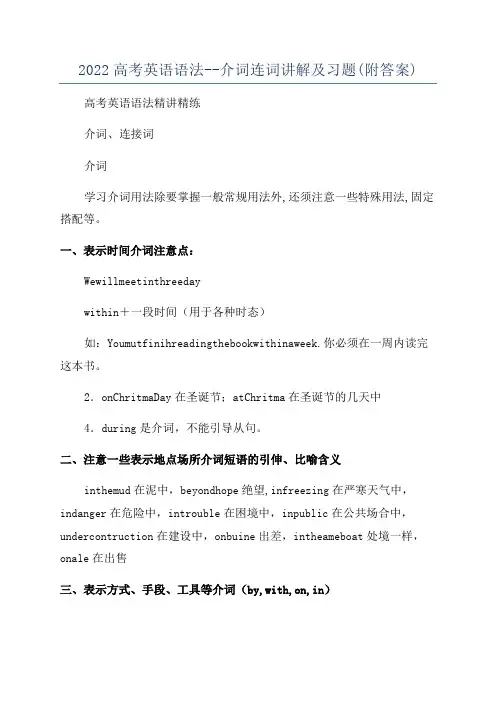
2022高考英语语法--介词连词讲解及习题(附答案)高考英语语法精讲精练介词、连接词介词学习介词用法除要掌握一般常规用法外,还须注意一些特殊用法,固定搭配等。
一、表示时间介词注意点:Wewillmeetinthreedaywithin+一段时间(用于各种时态)如:Youmutfinihreadingthebookwithinaweek.你必须在一周内读完这本书。
2.onChritmaDay在圣诞节;atChritma在圣诞节的几天中4.during是介词,不能引导从句。
二、注意一些表示地点场所介词短语的引伸、比喻含义inthemud在泥中,beyondhope绝望,infreezing在严寒天气中,indanger在危险中,introuble在困境中,inpublic在公共场合中,undercontruction在建设中,onbuine出差,intheameboat处境一样,onale在出售三、表示方式、手段、工具等介词(by,with,on,in)1.by:Theblindmenthoughttheycouldlearnwhattheelephantlookedli kebytouchingit./makealivingbyteaching/byhand手工地,靠手工地,byletter,bypot,byelectricity,learnth.byheart,truckbythebeauty因美丽而着迷Hewapaidbythehour/theday/month/…他按时/日/月/…被付给工钱。
byplane/train/hip/air/water/ea/…,bymeanof用…手段,方式;bywayof经由,取道于…learnEnglihby/over/throug h/ontheradio2.on:liveonfood,kneelonone¢knee,lie/leeponone¢back/ide/face 仰/侧/俯卧(睡)3.in:inEnglih,inink,inilence,inonevoice异口同声地,inahurry 匆忙地,inurprie惊讶地4.with:writewithapen,workwithone¢hand,mellwithone¢noe,beatt hehorewithawhip(鞭子)四、相近介词(短语)辨析about“关于”,知识性或随便谈论:adicuionabouttheplan3.over在…正上方,under在…正下方above在…上面(不一定垂直上方),below在…下面4.inanhour一小时后,用于将来时afteranhour一小时后,用于过去时5.beide在…旁边beide除…之外(还有)e某cept除…之外e某ceptfor除(非同类事物)之外6.on/inthetreetat50DongfengRoad在东风路50号高考英语语法精讲精练7.aholeinthewallapictureonthewallapieceofnewinthenewpaperthewordintheenvelopthemonkeyinthetreetheappleonthetree(树上的苹果。
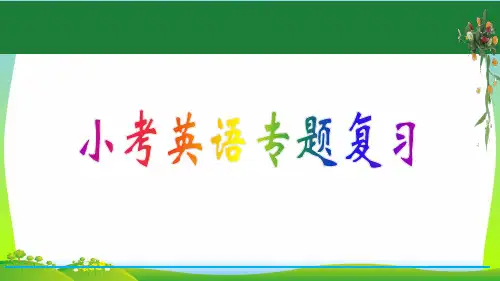
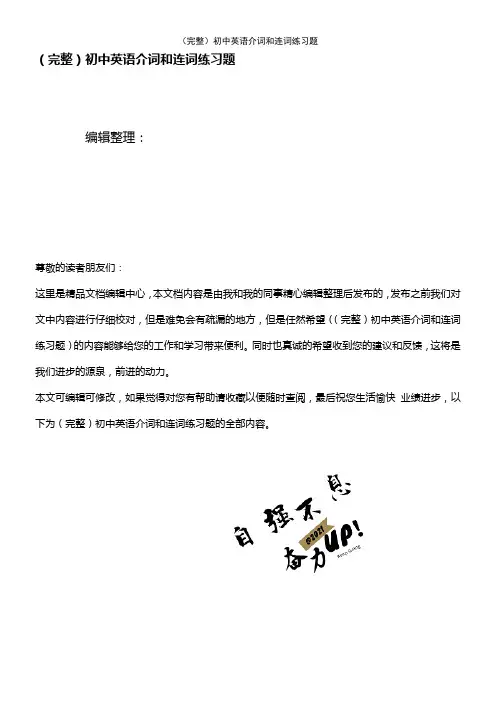
(完整)初中英语介词和连词练习题编辑整理:尊敬的读者朋友们:这里是精品文档编辑中心,本文档内容是由我和我的同事精心编辑整理后发布的,发布之前我们对文中内容进行仔细校对,但是难免会有疏漏的地方,但是任然希望((完整)初中英语介词和连词练习题)的内容能够给您的工作和学习带来便利。
同时也真诚的希望收到您的建议和反馈,这将是我们进步的源泉,前进的动力。
本文可编辑可修改,如果觉得对您有帮助请收藏以便随时查阅,最后祝您生活愉快业绩进步,以下为(完整)初中英语介词和连词练习题的全部内容。
初中英语介词和连词练习题一. 单项填空()1. We traveled overnight to Paris and arrived _______ 5 o’clock ______ the morning.A. on; in B。
at; in C. at; on D。
in; on( )2。
Where’s Lily? We are all here _______ her。
A. beside B。
about C. except D。
with( )3。
She sent her friend a postcard _______ a birthday present.A. on B。
as C. for D。
of( )4. Jack has studied Chinese in this school _______ the year of 2000.A. since B。
in C。
on D. by( )5。
—-—What is a writing brush, do you know?-——It’s _______ writing and drawing。
A。
with B. to C. for D. by( )6。
English is widely used ______ travellers and business people all over the world.A。
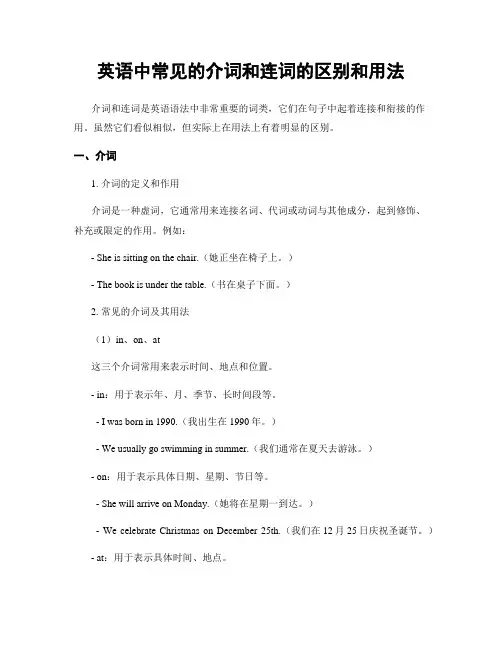
英语中常见的介词和连词的区别和用法介词和连词是英语语法中非常重要的词类,它们在句子中起着连接和衔接的作用。
虽然它们看似相似,但实际上在用法上有着明显的区别。
一、介词1. 介词的定义和作用介词是一种虚词,它通常用来连接名词、代词或动词与其他成分,起到修饰、补充或限定的作用。
例如:- She is sitting on the chair.(她正坐在椅子上。
)- The book is under the table.(书在桌子下面。
)2. 常见的介词及其用法(1)in、on、at这三个介词常用来表示时间、地点和位置。
- in:用于表示年、月、季节、长时间段等。
- I was born in 1990.(我出生在1990年。
)- We usually go swimming in summer.(我们通常在夏天去游泳。
)- on:用于表示具体日期、星期、节日等。
- She will arrive on Monday.(她将在星期一到达。
)- We celebrate Christmas on December 25th.(我们在12月25日庆祝圣诞节。
)- at:用于表示具体时间、地点。
- The meeting will start at 9 o'clock.(会议将在9点开始。
)- I met her at the library.(我在图书馆遇见了她。
)(2)with、without、by这三个介词常用来表示伴随、条件和方式。
- with:表示伴随、附带。
- She went to the party with her friends.(她和她的朋友们一起去了派对。
) - He always carries a book with him.(他总是随身带着一本书。
)- without:表示没有、不带。
- I can't live without you.(没有你我无法生活。
)- Please don't leave without saying goodbye.(请不要离开而不说再见。
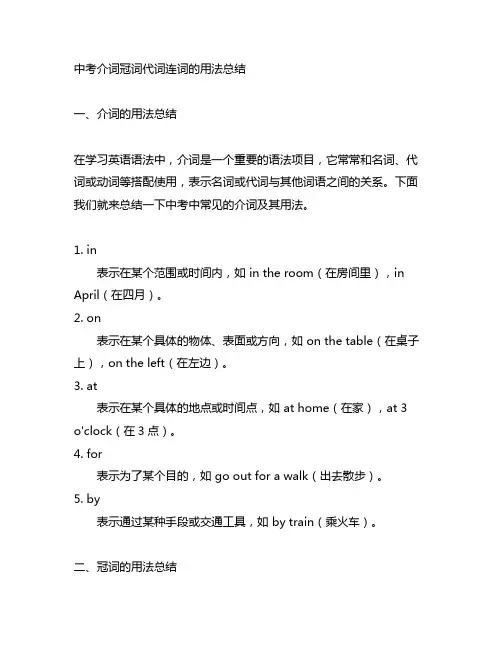
中考介词冠词代词连词的用法总结一、介词的用法总结在学习英语语法中,介词是一个重要的语法项目,它常常和名词、代词或动词等搭配使用,表示名词或代词与其他词语之间的关系。
下面我们就来总结一下中考中常见的介词及其用法。
1. in表示在某个范围或时间内,如 in the room(在房间里),in April(在四月)。
2. on表示在某个具体的物体、表面或方向,如 on the table(在桌子上),on the left(在左边)。
3. at表示在某个具体的地点或时间点,如 at home(在家),at 3 o'clock(在3点)。
4. for表示为了某个目的,如 go out for a walk(出去散步)。
5. by表示通过某种手段或交通工具,如 by train(乘火车)。
二、冠词的用法总结冠词是英语中一个比较难点的语法项目,分为定冠词“the”和不定冠词“a/an”。
下面我们来总结一下中考中常见的冠词用法。
1. 定冠词“the”表示特指,如 the sun(太阳)。
2. 不定冠词“a/an”表示泛指,如 a book(一本书)。
三、代词的用法总结代词是用来代替名词的词语,它能够减少重复,使语言更加简洁。
在中考中,代词也是一个重要的语法项目。
下面我们来总结一下中考中常见的代词及其用法。
1. 人称代词主格:I(我)、you(你)、he(他)、she(她)、it(它)、we(我们)、you(你们)、they(他们)。
宾格:me(我)、you(你)、him(他)、her(她)、it (它)、us(我们)、you(你们)、them(他们)。
形容词性:my/mine(我的)、your/yours(你的)、his(他的)、her/hers(她的)、its(它的)、our/ours(我们的)、your/yours(你们的)、their/theirs(他们的)。
2. 物主代词指代名词所有物,如 mine(我的)、yours(你的)、his(他的)、hers(她的)、its(它的)、ours(我们的)、yours(你们的)、theirs(他们的)。
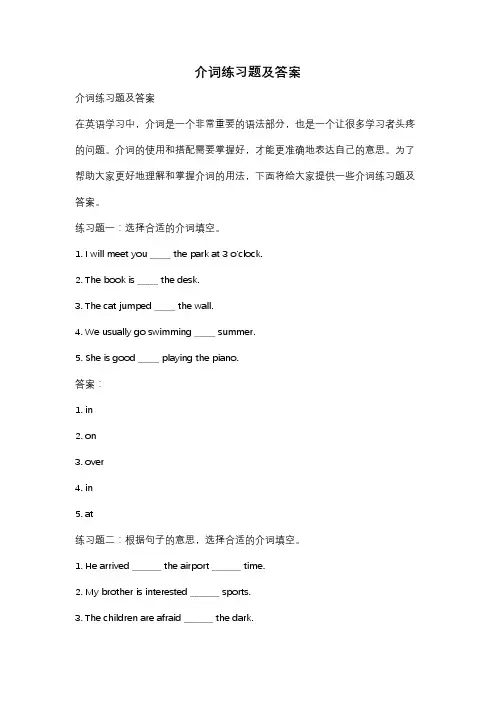
介词练习题及答案介词练习题及答案在英语学习中,介词是一个非常重要的语法部分,也是一个让很多学习者头疼的问题。
介词的使用和搭配需要掌握好,才能更准确地表达自己的意思。
为了帮助大家更好地理解和掌握介词的用法,下面将给大家提供一些介词练习题及答案。
练习题一:选择合适的介词填空。
1. I will meet you _____ the park at 3 o'clock.2. The book is _____ the desk.3. The cat jumped _____ the wall.4. We usually go swimming _____ summer.5. She is good _____ playing the piano.答案:1. in2. on3. over4. in5. at练习题二:根据句子的意思,选择合适的介词填空。
1. He arrived _______ the airport _______ time.2. My brother is interested _______ sports.3. The children are afraid _______ the dark.4. She is proud _______ her achievements.5. We are waiting _______ the bus stop.答案:1. at, on2. in3. of4. of5. at练习题三:根据句子的意思,选择合适的介词填空。
1. The cat is hiding _______ the bed.2. They are going to travel _______ Europe next year.3. The movie starts _______ 7 o'clock.4. I am going to the supermarket _______ some groceries.5. He is sitting _______ the table.答案:1. under2. in3. at4. for5. at练习题四:选择合适的介词填空。
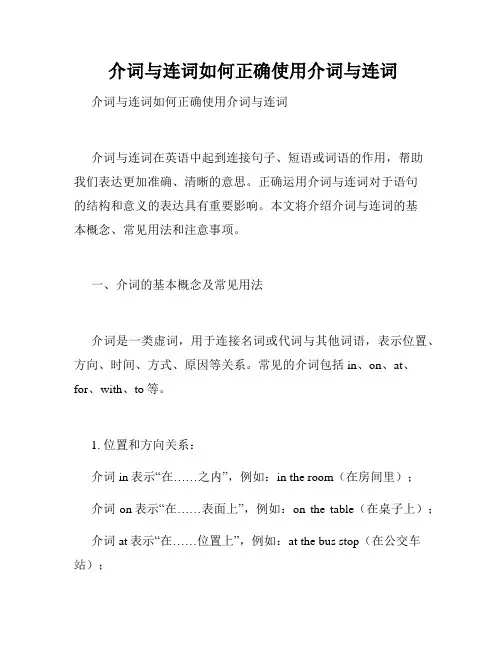
介词与连词如何正确使用介词与连词介词与连词如何正确使用介词与连词介词与连词在英语中起到连接句子、短语或词语的作用,帮助我们表达更加准确、清晰的意思。
正确运用介词与连词对于语句的结构和意义的表达具有重要影响。
本文将介绍介词与连词的基本概念、常见用法和注意事项。
一、介词的基本概念及常见用法介词是一类虚词,用于连接名词或代词与其他词语,表示位置、方向、时间、方式、原因等关系。
常见的介词包括in、on、at、for、with、to等。
1. 位置和方向关系:介词in表示“在……之内”,例如:in the room(在房间里);介词on表示“在……表面上”,例如:on the table(在桌子上);介词at表示“在……位置上”,例如:at the bus stop(在公交车站);介词over表示“在……上方”,例如:over the bridge(在桥上)。
2. 时间关系:介词in表示“在……时间内”,例如:in the morning(在早晨);介词on表示“在……日子”,例如:on Monday(在星期一);介词at表示“在……时刻”,例如:at six o'clock(在六点钟);介词for表示“持续时间”,例如:for two hours(持续两个小时)。
3. 方式和原因关系:介词with表示“用……”,例如:with a pen(用一支笔);介词by表示“通过……方式”,例如:by bus(乘坐公交车);介词for表示“为了……”,例如:for fun(为了娱乐);介词because of表示“因为……”,例如:because of the rain(因为下雨)。
二、连词的基本概念及常见用法连词是一类用于连接词语、短语或句子的虚词,起到衔接、并列、选择、转折等作用。
常见的连词包括and、but、or、so、although、because等。
1. 并列关系:连词and表示“和”,用于连接同类的词或短语,例如:apples and oranges(苹果和橙子);连词or表示“或者”,用于提供选择的情况,例如:tea or coffee (茶或咖啡);连词but表示“但是”,用于表示转折关系,例如:I like music, but I don't like dancing(我喜欢音乐,但是我不喜欢跳舞)。

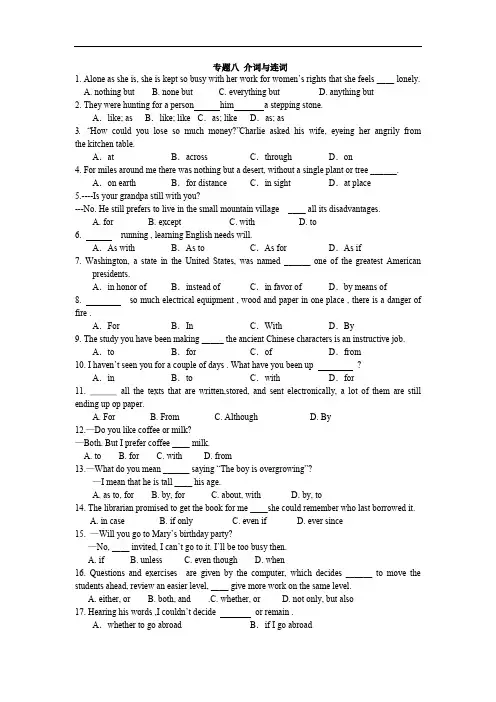
专题八 介词与连词 1. Alone as she is, she is kept so busy with her work for women’s rights that she feels ____ lonely. A. nothing but B. none but C. everything but D. anything but 2. They were hunting for a person him a stepping stone. A.like; as B.like; like C.as; like D.as; as 3. “How could you lose so much money?”Charlie asked his wife, eyeing her angrily from the kitchen table. A.at B.across C.through D.on 4. For miles around me there was nothing but a desert, without a single plant or tree ______. A.on earth B.for distance C.in sight D.at place 5.----Is your grandpa still with you? ---No. He still prefers to live in the small mountain village ____ all its disadvantages. A. for B. except C. with D. to 6. running , learning English needs will. A.As with B.As to C.As for D.As if 7. Washington, a state in the United States, was named ______ one of the greatest American presidents. A.in honor of B.instead of C.in favor of D.by means of 8. so much electrical equipment , wood and paper in one place , there is a danger of fire . A.For B.In C.With D.By 9. The study you have been making _____ the ancient Chinese characters is an instructive job. A.to B.for C.of D.from 10. I haven’t seen you for a couple of days . What have you been up ? A.in B.to C.with D.for 11. ______ all the texts that are written,stored, and sent electronically, a lot of them are still ending up op paper. A. For B. From C. Although D. By 12.—Do you like coffee or milk? —Both. But I prefer coffee ____ milk. A. to B. for C. with D. from 13.—What do you mean ______ saying “The boy is overgrowing”? —I mean that he is tall ____ his age. A. as to, for B. by, for C. about, with D. by, to 14. The librarian promised to get the book for me ____she could remember who last borrowed it. A. in case B. if only C. even if D. ever since 15. —Will you go to Mary’s birthday party? —No, ____ invited, I can’t go to it. I’ll be too busy then. A. if B. unless C. even though D. when 16. Questions and exercises are given by the computer, which decides ______ to move the students ahead, review an easier level, ____ give more work on the same level. A. either, or B. both, and .C. whether, or D. not only, but also 17. Hearing his words ,I couldn’t decide or remain . A.whether to go abroad B.if I go abroad C.if to go abroad D.to go abroad 18. he thought he was helping us with the work, he was actually in the way. A.Although B.Unless C.Because D.When 19. —When did he leave the classroom? —He left you turned back to write on the blackboard. A.the minute B.the time C.until D.before 20. _____ I know the money is safe, I shall not worry about it. A. Even though B. Unless C. As long as D. While 21. Jack had traveled six miles across the Channel _____his engine failed and was forced to land on the sea . A.when B.until C.after D.since 22. Not that I’m unwilling to lend you a hand , I’m too busy for the moment . A.because B.but that C.but D.however 23. John waited at the bus-stop for nearly half an hour the bus finally arrived . A.when B.as C.before D.while 24. Although he knew little about the large amount of work done in the field , he succeeded other more well-informed experimenters failed. A.as B.unless C.what D.where 25. I thought things would get better, but it is they are getting worse. A.before B.because C.as D.after 26. —We’re supposed to be there at 6:00? —_______ I know. A.As soon as B.As far as C.So long as D.As possible as 27. I was advised to arrange for insurance(保险) _______ I needed medical treatment. A.nevertheless B.although C.in case D.so that 28. I’m thinking about going to Germany this summer and I need your advice. You’re the best person I know to answer my questions, you’re German. A.after B.before C.for D.unless 29. I read those words I had no idea what I was going to be and I made more efforts on writing afterwards. A.When B.Unless C.Until D.While 30. —It seems that his health is improving. —Yes. It is ten years ___ he _____. A. that, smoked B. after, didn’t smoke C. since, smoked D. before, smoked 1.【答案】:D 【解析】:anything but绝对不。尽管她是独自一人,但她忙于妇女权益工作,以至于她绝不感到寂寞。故选D。 2.【答案】:A 【解析】:like;像;as;作为,他们正寻找像他这样人作为垫脚石。故选A。 3.【答案】:B 【解析】:from across the kitchen:从餐桌那头儿。如SBI L91:Today you can either fly to Abu Simbel or to take a boat from across ..........the lake.
介词的专项练习这份文档旨在帮助读者加强对介词的理解和应用。
介词在英语中起着连接词与词或词与句的作用,使用正确的介词能够使表达更准确、更自然。
下面是一些专项练,希望能够帮助你提高对介词的掌握。
一、选择恰当的介词填空1. My brother is ________________ his room.2. I usually go to work ________________ foot.3. The book is ________________ the table.4. They live ________________ the first floor.5. She is good ________________ singing.二、改正句子中不正确的介词1. I'm interested at music.2. She is afraid with snakes.3. The cat is sleeping on the tree.4. I walk to the park in the mornings.5. They arrived in my house at 6 o'clock.三、根据提示写出正确的介词短语1. He is angry ________________ me (with / at).2. I'm looking forward ________________ the party (to / for).3. They are talking ________________ the phone (on / in).4. The cat is hiding ________________ the table (behind / under).5. She helps me ________________ my homework (with / for).四、根据上下文填入合适的介词1. I am going ________________ a trip ________________ my friends.2. The cat is sitting ________________ the chair________________ the window.3. She is standing ________________ the door ________________ her hands.4. The book is ________________ the shelf ________________ the other books.5. We arrived ________________ the airport ________________ time.五、根据图片选择合适的介词请根据以下图片选择合适的介词填空:1. The cat is hiding ________________ the box.2. The girl is standing ________________ the tree.3. The car is parked ________________ the garage.4. The bird is flying ________________ the sky.六、写出以下句子中所有的介词1. She is waiting for the bus ________________ the bus stop.2. The keys are ________________ the table.3. They are going to the park ________________ their bicycles.4. He is studying ________________ the library.5. The ball rolled ________________ the hill.。
介词和连词中考命题趋势考纲解读(介词和连词在近5年考试中的考查点)1. 熟悉和掌握常用介词和连词的用法。
2. 了解和运用一些常见的介词短语及连词的使用方法。
3. 能正确区分并列连词和从属连词,并掌握其用法。
命题预测1. 介词的考查方式以单项选择的形式为主,也会在单词拼写、完形填空中进行考查。
2. 据统计,介词的常考点有:(1)表示时间的介词,如:2019·临沂,17题;2019·咸宁,30题。
(2)表示地点方位的常用介词,如:2019·大庆,2题。
(3)表示方式、手段或工具的介词,如:2019·云南,21题。
(4)介词的常见搭配,如:2019·徐州,7题。
连词的考点有:(1)并列连词的用法,如:2019·绥化,6题;2019·临沂,28题。
(2)从属连词的用法,如:2019·长春,13题;2019·乐山,30题。
3. 预计今后中考中介词考查的重点将是其基本用法(同时也要注意介词的常见搭配的情况);连词的考查将以并列连词和从属连词基本含义为重点,也要注意考查连词的特殊用法,比如:“就近原则”,不能出现在同一个句子中的连词等。
一、介词概述:介词又叫前置词,是一种虚词。
介词是一种用来表示词与词或者词与句之间的关系的词,在句中不能单独作句子成分。
介词一定要有宾语,充当宾语的一般有名词、代词或相当于名词的其他词、短语或句子。
如:I am in school. in the morningThanks for helping me. What about going for a walk?二、介词的句法功能:介词不能独立在句中作成分,介词后必须与名词、代词或动名词构成介词短语在句中充当一个成分,表示人、物、事件等与其他人、物、事件等之间的关系。
1. 作定语:The book on the table is mine.2. 作状语:We have breakfast at seven. (表时间);They were late for meeting because of the heavy rain. (表原因);They started the machine by pressing the button. (表方式)3. 作表语:My dictionary is in the bag.4. 作宾语补足语:I found him in the office.三、介词分类:①时间介词;②方位介词;③方式介词;④目的介词;⑤原因介词;⑥运动方向介词;⑦比较介词等等。
1 介词和连词的用法 (一) 表示时间的介词 1. 英语里最常见的时间介词有:at, in, on, before, after和from。 2. at , in和on这三个词都表示时间。 at主要指具体的钟点:at half past eight 在八点半 in一般指某一段时间:in January 在一月份 on指具体在某一天:on Monday 在星期一 3. before和after表示时间的先后顺序。 before表示“在……之前”。 You should wash your hands before eating. 吃饭前你应该洗手。 after表示“在……之后”。 They often play basketball after dinner. 他们放学后经常打篮球。 4. from作时间介词含有“从……开始”的意思,常和to连用,组成“from…to…”的结构,表示“从……到……”的意思。 We go to school from Monday to Friday. 我们从周一到周五上学。 (二)表示方位的介词,也就是表示位置和地点的介词。 1. 小学阶段常见的方位介词有:on, in, at, under, over, above, below, about, around, between等。 2. on, over和above 这三个词都有“在……上面”的意思,但它们所表示的方位还是有些不同。 on表示两个物体的表面相互接触。如: There is a book on the desk. 桌上有一本书。 The boy is sleeping on the desk. 那个孩子睡在地上。 over表示“在……的正上方”,两个物体表面没有接触。如: There is a light bulb over my head. 在我头顶上有一个灯泡。 above表示两个物体中一个在另一个的上方,如: The plane is flying above the clouds. 飞机上云层上飞行。 There are four lights above our head. 在我们头上有四盏灯。 3. under和below都有“在……的下面”的意思,但它们有区别: 2
under表示“在……的正下方”,其反义词是over。 There is a ball under the chair. 椅子下面有一个球。 They are sitting under a big tree. 他们正坐在一棵大树下面。 below表示“在……”的下面,不强调是否在正下方。 Their house is below mine. 他们家的房子在我家的下面。 4. in表示位置“在……里面”,也可以用来表示在一个很大的空间内。 The children are playing in the room. 孩子们正在房间里玩。 All my books are in my bag. 我所有的书都在我的书包里。 5. around表示“在……周围”。 There are lots of flowers around the house. 房子周围有许多花。 The children sat around the Christmas tree and sang happily. 孩子们围坐在圣诞树旁边高兴地唱歌。 6. behind表示“在……的后面”。 Don’t hide yourself behind a tree. 别躲在树后。 7. in front of表示“在……的前面”。 There are some trees in front of the house. 房子前面有一些树。 8. between表示“在两者之间”。 My home is between the two mountains. 我家在两座大山之间。 Guang Jie sits between Li Lei and Fang Ning. 冠杰坐在李磊和芳宁之间。 (三)表示方式的介词 9. 常见的表示方式的介词有:by, with, in等。 10. by表示“靠……”,“用……”。 11. with表示“使用……”,“和……一起”,“有……”,“具有……” “带有……”。 12. in表示“用……(语言)”。 My father goes to work by car. 我父亲开车上班。 I can see with eyes. 我能用眼睛看。 I can speak in English. 我会用英语讲。 连词 3
and意思是“和”,表示并列和对称。 I can speak English and Chinese. 我会讲英语和中文。 I like apples, bananas and grapes. 我喜欢苹果、香蕉和葡萄 1. or意思是“或者”,“还是”,表示选择。 Is your friend is a boy or a girl? 你的朋友是男孩还是女孩? Do you learn English or French? 你学英语还是法语? 注意: (误)I don’t like coffee and tea. (正) I don’t like coffee or tea. 我不喜欢喝咖啡和茶。 (正)I like coffee and tea. 我喜欢喝咖啡和茶。 2. but意思是“但是”,表示转折。 I have a cold, but I don’t take medicine. 我感冒了,但我没吃药。 The skirt is nice, but it’s too expensive. 这条裙子很漂亮,但太贵了。 3. so意思是“因此”,“所以”。 It’s dark, so I must go now. 天黑了,所以我得走了。 You got up too late, so you missed the bus. 你起床晚了,所以错过了公共汽车。 一、选择填空。 ( ) 1. The Greens were watching TV _____ I came in. A. before B. after C. when ( ) 2. Jack was sad ____ he failed his math exam again. A. so B. because C. but ( ) 3. The bus arrived _____7:30 a. m. A. on B. at C. in ( ) 4. Your mouth is _____ your nose. A. under B. below C. near ( ) 5. We don’t go to school _____Saturday and Sunday. A. on B. in C. at ( ) 6. Did you go to the zoo _____ foot? A. by B. on C. in ( ) 7. I write _____my hand. A. in B. with C. by ( ) 8. Can you sing this song ______English? A. in B. with C. on ( ) 9. He learns English _____ TV. A. in B. on C. with ( ) 10. Tony comes _____ Australia. 4
A. from B. to C. in ( ) 11. Everyone is sitting ___ the floor, but Mr Brown is sitting ____ a chair _____ the corner. A. over, in, on B. about, on, at C. on, on, in ( ) 12. During the weekdays, Jim gets up early ____ the morning and goes to bed late ____ night .But _____ weekends he sleeps until midday. A. on, at, at B. in, at, on C. in, in, at ( ) 13. The mother is coming back ____ an hour. A. after B. for C. in ( ) 14. Don’t worry, Tom will return______. A. before long B. long before C. long ago ( ) 15. Paper is often made ____ wood. A. by B. in C. of 二.介词填空 1. Tony is ________ Canada. 2. What is the name ________ the factory? 3. Betty is English. What ________ you? 4. Where do you come ________? 5. Do the students stay ________ home ________ Saturday? 6. The meeting ended ________ 6 p.m. 7. We’ll play football ________ class. 8. —where are you from? 9. —I am ________ Beijing. 10. Let’s count the numbers ________ one ________ fifty. 11. —Where shall we meet? 12. —We’ll meet ________ home. 13. He is good ________ swimming. 14. Tom gets ________ at seven every morning. 15. ________ Sunday morning, he played football with his friends. 16. What’s wrong ________ you?